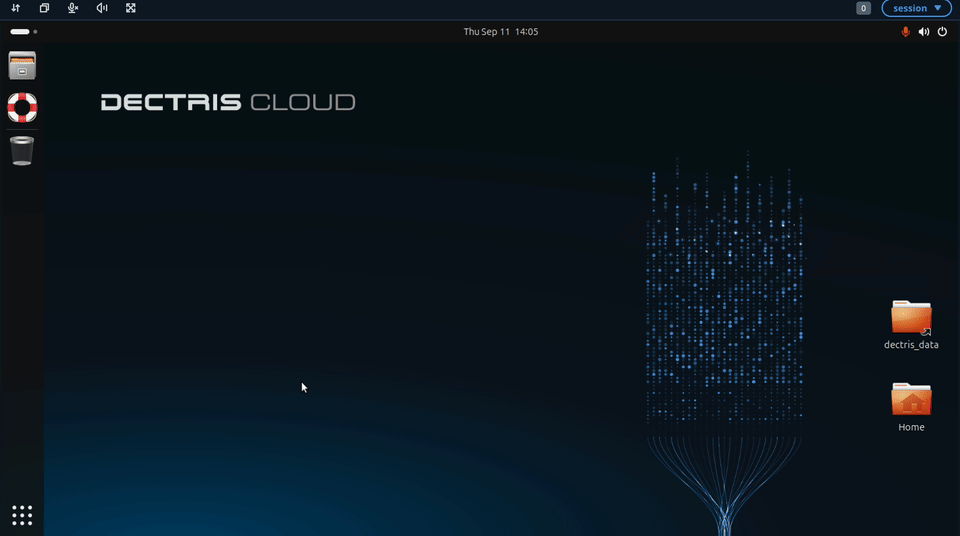Python Basics Ubuntu
Introduction
The Python Basics Ubuntu environment provides a lightweight Ubuntu-based setup for running and testing Python scripts. It is intended as a general-purpose environment for basic Python usage, quick prototyping, and learning.
This environment is the system environment equivalent of the Python Basics environment, which can be used to start Jupyter Notebook sessions.
Environment configuration
Installation directories
Miniconda (version 25.7.0) has been installed in:
/opt/conda/While the Conda basics environment is installed in:
/opt/conda/envs/basics/containing:
- Core language
python=3.10.18
- Scientific libraries
numpyscipypandas
- Visualization libraries
matplotlibjupyterlabipythonseabornplotly
- Machine learning, statistics, and scientific computing
scikit-learnscikit-imagestatsmodelssympynumbajoblib
- Image and file format support
pillowh5pyopenpyxlxlrdpyyaml
Usage example
To use the Conda basics environment, open a terminal and run
conda activate basicsFollowing this, python (version 3.10.18) with the installed packages can be called or run using python or python3:

Configuring job templates
When creating job templates with this environment, the Conda basics environment can be activated via:
source /opt/conda/etc/profile.d/conda.sh
conda activate basicsFollowing the activation of the environment, you can run your own uploaded python script within the environment. A minimal example job script would be (assuming an uploaded hello_world.py):
#!/bin/bash
set -euo pipefail
source /opt/conda/etc/profile.d/conda.sh
conda activate basics
python3 $JOB_TEMPLATE_DIR/hello_world.py Public job templates
Example of job template(s) that have been created for this environment and made public:
- Simple python example: A simple example job template that shows how to upload a python script and execute it within the Conda
basicsenvironment. - Double Moons - Machine Learning Example: Machine learning demo that trains an SVM on the two-moons dataset and lets you classify four user-chosen points.
Version history
Version 0
- Initial installation of Miniconda (version 25.7.0) and listed packages
Version 1
- Build error (not useable)
Version 2
- Rebuild of Version 0 to support multiple regions.
References
- Python 3.10 documentation: https://docs.python.org/3.10/
- Numpy: Harris, Charles R., et al. "Array programming with NumPy." nature 585.7825 (2020): 357-362. https://doi.org/10.1038/s41586-020-2649-2
- SciPy: Virtanen, Pauli, et al. "SciPy 1.0: fundamental algorithms for scientific computing in Python." Nature methods 17.3 (2020): 261-272. https://doi.org/10.1038/s41592-019-0686-2
- Pandas: McKinney, Wes. "Data structures for statistical computing in Python." scipy 445.1 (2010): 51-56. https://doi.org/10.25080/Majora-92bf1922-00a
- Matplotlib: Hunter, John D. "Matplotlib: A 2D graphics environment." Computing in science & engineering 9.03 (2007): 90-95. https://doi.org/10.1109/MCSE.2007.55
- Jupyter: Kluyver, Thomas, et al. "Jupyter Notebooks–a publishing format for reproducible computational workflows." Positioning and power in academic publishing: Players, agents and agendas. IOS press, 2016. 87-90. https://doi.org/
10.3233/978-1-61499-649-1-87 - Scikit-learn: Pedregosa, Fabian, et al. "Scikit-learn: Machine learning in Python." the Journal of machine Learning research 12 (2011): 2825-2830.
- Scikit-image: Van der Walt, Stefan, et al. "scikit-image: image processing in Python." PeerJ 2 (2014): e453. https://doi.org/10.7717/peerj.453
- Seaborn: Waskom, Michael L. "Seaborn: statistical data visualization." Journal of open source software 6.60 (2021): 3021. https://doi.org/10.21105/joss.03021
- Plotly: https://plotly.com/python
- Statsmodels: Seabold, Skipper, and Josef Perktold. "Statsmodels: econometric and statistical modeling with python." SciPy 7.1 (2010): 92-96. https://doi.org/10.25080/Majora-92bf1922-011
- SymPy: Meurer, Aaron, et al. "SymPy: symbolic computing in Python." PeerJ Computer Science 3 (2017): e103. https://doi.org/10.7717/peerj-cs.103
- Numba: Lam, Siu Kwan, Antoine Pitrou, and Stanley Seibert. "Numba: A llvm-based python jit compiler." Proceedings of the Second Workshop on the LLVM Compiler Infrastructure in HPC. 2015. https://doi.org/10.1145/2833157.2833162
- Joblib: https://joblib.readthedocs.io/en/stable/
- Pillow: https://pypi.org/project/pillow/
- h5py: https://www.h5py.org/
- netCDF4: https://unidata.github.io/netcdf4-python/
- OpenPyXL: https://openpyxl.readthedocs.io/en/stable/
- xlrd: https://xlrd.readthedocs.io/en/latest/
- PyYAML: https://pyyaml.org/
